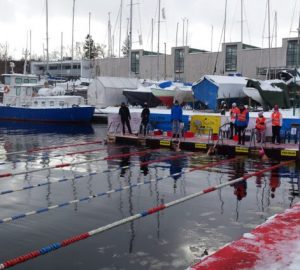9 things to do in a race, other than racing
In our previous newsletter we talked about racing and pushing yourself to your limits – something that many of us like to do from time to time – but it is possible to approach an open water swimming event with a different mind-set, and it can be both educational and very enjoyable.
If you’ve come from a pool swimming background you’ll most likely be totally tuned into the racing mentality. Every time you climb onto a starting block your goal is to hit the wall at the other end as hard and fast as possible. The outcome can be very binary: ecstasy if you beat your target, despair if you don’t. The relentless ticking of the clock is all that matters.
Pool trained swimmers – or athletes coming in from other time critical and competitive sports – often bring this attitude to open water. But while there’s nothing wrong with striving for maximum speed and peak performance, there’s a danger of missing out on some of the wonders of open water swimming.
To some, this may sound obvious, but for those whose every encounter with water ends up in a lung-bursting race, read on.
At our H2Open Day in last April we organised a ‘timed swim’. We deliberately didn’t call it a ‘race’ because we wanted to encourage first timers to get in the water without the pressure racing implies. Still, a number of swimmers clearly did treat this as a race and afterwards were keen to know their finishing times and positions. However, a group of swimmers wearing the red costumes of the Serpentine Swimming club held back at the start.
“You’re going to get left behind,” I said.
“That’s OK, we don’t race,” replied Nick Adams, a Serpentine club member, and also president of the Channel Swimming & Piloting Federation. “We’re just going to enjoy the swim.”
That’s interesting, I thought, but it also chimed with something Steven Munatones of Open Water Source said: “open water swimming rarely disappoints.” I also wondered what the connection might be between diving non-wetsuit into 11 degree water and enjoyment might be, but that’s a different story.
Because distances in open water are imprecise, and your speed is affected by the conditions, trying to make comparisons of your times from one swim to another has much less relevance than in the pool, so you don’t need to feel the crushing disappointment of failing to meet your expectations against the clock. The challenge is so much more than covering a fixed distance in as short a time as possible. Simply getting to the end is challenge enough in some cases. On top of that, you get to enjoy the wonderful experience of swimming outside, whether it’s the scenery or the sensation of cool water against your skin.
While we wouldn’t want to discourage anyone from racing (quite the opposite in fact), we do encourage swimmers not to treat every swimming event (or even training session) as an all-out race. Yes, you could argue that if you don’t want to race, you can always swim on your own or with friends for leisure, but there are advantages with organised events including the safety cover, camaraderie and the commitment to complete a particular distance. In some cases you can only access a particular stretch of water by entering an event.
If you’re a committed racer, we recommend you select one or two events in a season where you won’t feel compelled to push your limits or beat your friends, rivals or training partners. Instead of racing, set yourself a different challenge. E.g.
1) Swim non-wetsuit if allowed (a good way to slow down for many people)
2) Tune in all your senses to the swim. Your vision may be limited under the water, so what can you feel, smell and hear?
3) Swim breast-stroke (easier to enjoy the scenery)
4) Focus on a swimming technique you want to improve (such as bilateral breathing or high elbows)
5) Practice some open water skills without worrying about the time you’ll lose if things go wrong (rolling turns at buoys, drafting, sighting less frequently)
6) Swim at cruise pace rather than lung bursting race pace
7) Move aside from the centre line of the course and enjoy the space and freedom
8) Have a good time
9) Remember the slower you swim, the better value for money you get
After the swim, buy another swimmer a hot chocolate and ask them what they enjoyed rather than how fast they swam. Then remember to thank the event organiser, marshals and safety crew, and finally, don’t check the results after the event.
Let us know if you have any other suggestions.






